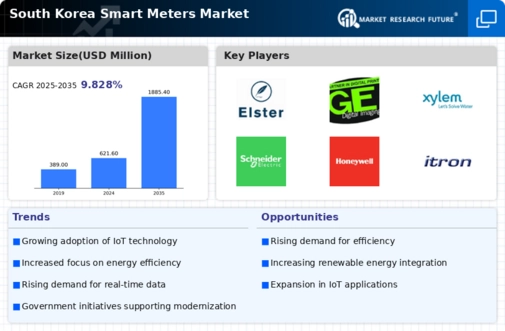The South Korea Smart Meters Market has evolved significantly in recent years, driven by advancements in technology and an increasing focus on energy efficiency. As the demand for smarter and more sustainable energy solutions grows, various players contribute to a competitive environment where innovation and strategic partnerships play crucial roles. The market is characterized by intense competition among established players, startups, and international entrants, all striving to enhance their technological capabilities and broaden their market reach. Rising investments in smart grid technologies, coupled with supportive government initiatives, further intensify competition and create opportunities for growth. Overall, the interplay of regulatory frameworks, consumer behavior, and technological developments shapes the competitive landscape of the South Korean smart meters market.Samsung Electronics stands out in the South Korea Smart Meters Market due to its strong brand presence and technological expertise. Renowned for its cutting-edge electronics and smart technologies, Samsung leverages its innovations to enhance the efficiency and functionality of smart meters. The company has focused on integrating the Internet of Things (IoT) into its meter solutions, allowing for real-time energy monitoring and management. This commitment to innovation positions Samsung as a formidable player in the market, especially given its substantial resources and investment capabilities. The company’s strong research and development infrastructure enables it to deliver high-quality products that meet the evolving demands of energy consumers in South Korea. Furthermore, Samsung's established distribution channels enhance its market presence, making it easier for the company to reach a wide customer base. Korea Electric Power Corporation holds a significant position in the South Korea Smart Meters Market, primarily due to its foundational role in electricity generation and distribution across the nation. The corporation has been actively involved in deploying smart metering solutions to improve grid management and energy efficiency for both residential and commercial users. Their key products encompass advanced metering infrastructure, which incorporates real-time data analytics capabilities to facilitate better energy consumption insights and customer service. The company also focuses on enhancing its operational capabilities through strategic partnerships and collaborative initiatives. Mergers and acquisitions in the past have further bolstered its operational capacity and expanded its technological base, allowing Korea Electric Power Corporation to maintain dominance in the market. The corporation's ongoing commitment to sustainable energy initiatives and smart grid developments ensures that it remains competitive and capable of addressing the dynamic needs of South Korea’s energy sector.



















